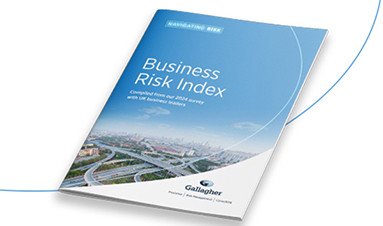An analysis of the most pressing concerns based on insights from 1,000 UK business leaders.

As a bus and/or coach operator, ensuring the vehicles in your fleet are roadworthy and adequately insured is a top priority. However, it can be easy to overlook what’s happening back at the depot with regards to your property insurance, particularly if you have not recently reviewed your cover.
Property is a common area of underinsurance for businesses, regardless of size or sector. Valuations can be out of date or incorrectly calculated, or policy limits may be insufficient—and such issues may not become apparent until the business needs to make a claim.
This issue is now being amplified by the rising cost of construction materials, which has the potential to place businesses into a situation where their total building sums insured no longer reflects the actual cost of reinstating their property.
Why are construction costs rising?
The ‘perfect storm’ of rising inflation, energy costs, Brexit and COVID-19 has led to significant challenges for the construction industry. The cost of materials has soared in response to supply chain issues, and skills shortages are also key constraints, pushing up the cost of labour.
In each of the last 12 months, the price of building materials has risen, showing an overall cost increase of over 23% in the space of a year.1 For the next 12 months it is predicted that this trend will continue, with nine out of 10 material suppliers expecting costs to increase further.2
What could this mean for your business?
If you have not had your property correctly valued for insurance purposes recently, there may be a shortfall in your cover, even if the premises have not been altered or improved. Your sum insured should reflect the rebuild cost, which is the total cost to rebuild the premises from scratch – regardless of whether it is your intention to reinstate the property in the same way. If it does not, you may not get the pay-out you would expect in the event of a claim on your policy—and this relates to any claim, not just a claim for a total rebuild.
No matter how large or small the claim amount, you may not receive the full settlement if your policy has an element of underinsurance. This is due to the ‘average clause’ that can be applied by the insurer, which can reduce the settlement amount by the same percentage the asset is underinsured (in this case, your property).
Average clause example:
If a property has a reinstatement value of £1.8 million on an insurance policy, and needs to claim £240,000 for repairs due to flood or storm damage, it would be assumed that cover was adequate. However, if the insurer can establish the total cost to rebuild the property is actually £2 million, they can claim that the policyholder had inadequate cover in place (in this case cover amounts to 90%, so there is a 10% shortfall or ‘underinsurance gap’). Under the average clause, the insurer can then reduce the claim amount by the same proportion as the amount of underinsurance (10%)—so a £240,000 claim becomes £216,000, leaving the business financially liable for the £24,000 difference —even though they had £1.8 million of insurance in place.
Getting a reinstatement cost valuation
Managing the risk of underinsurance involves doing the groundwork to provide an accurate valuation to the insurer. Buildings insurance reinstatement cost valuations should be carried out by qualified building surveyors, whose activities are regulated by the Royal Institution of Chartered Surveyors (RICS), following the guidance contained within their current practice standards.
While materials and labour are obvious considerations, you should also consider factors such as professional fees (architects, legal, planning), demolition or make-safe costs, and total fit-out costs. Having your valuation carried out by an independent professional can help you ensure that all of these areas are thoroughly examined.
How can Gallagher help?
Our Transportation team can help you secure adequate cover for your premises, providing an extra set of eyes to ensure you have a clear, in-depth picture of cost, value and liability.
We offer a valuation service to our clients through our strategic partnership with international asset consultants. Our providers audit your current values to make sure they are reasonable, and give you useful insight into the operational business issues that could influence your levels of cover. They may also help you determine declared value ranges for your assets, enabling you to integrate new items into your insurance portfolio quickly, easily and accurately.
Our direct access to the available insurance market for the transport industry means that we are well-placed to keep costs down, where possible. Beyond insurance placement, our team will support you throughout the policy year should your cover requirements change and you need to make amendments to your policy. And, in the event of a claim, our in-house claims team and loss adjusters will work closely with you to bring about the desired resolution.
Please get in touch if you would like more information or to book a property valuation or insurance review with our team. We are here to help you protect all aspects of your business.
- Department for Business, Energy and Industrial Strategy’s (BEIS) Monthly Statistics of Building Materials and Components report for October 2021: https://assets.publishing.service.gov.uk/government/uploads/system/uploads/attachment_data/file/1030765/Monthly_Statistics_of_Building_Materials_and_Components_-_Commentary__October_2021.pdf
- https://www.constructionnews.co.uk/supply-chain/material-suppliers-expect-prices-to-rise-over-next-12-months-01-11-2021/
CONDITIONS AND LIMITATIONS
This note is not intended to give legal or financial advice, and, accordingly, it should not be relied upon for such. It should not be regarded as a comprehensive statement of the law and/or market practice in this area. In preparing this note we have relied on information sourced from third parties and we make no claims as to the completeness or accuracy of the information contained herein. It reflects our understanding as at 27/01/2022, but you will recognise that matters concerning COVID-19 are fast changing across the world. You should not act upon information in this bulletin nor determine not to act, without first seeking specific legal and/or specialist advice. Our advice to our clients is as an insurance broker and is provided subject to specific terms and conditions, the terms of which take precedence over any representations in this document. No third party to whom this is passed can rely on it. We and our officers, employees or agents shall not be responsible for any loss whatsoever arising from the recipient’s reliance upon any information we provide herein and exclude liability for the content to fullest extent permitted by law. Should you require advice about your specific insurance arrangements or specific claim circumstances, please get in touch with your usual contact at Gallagher.




